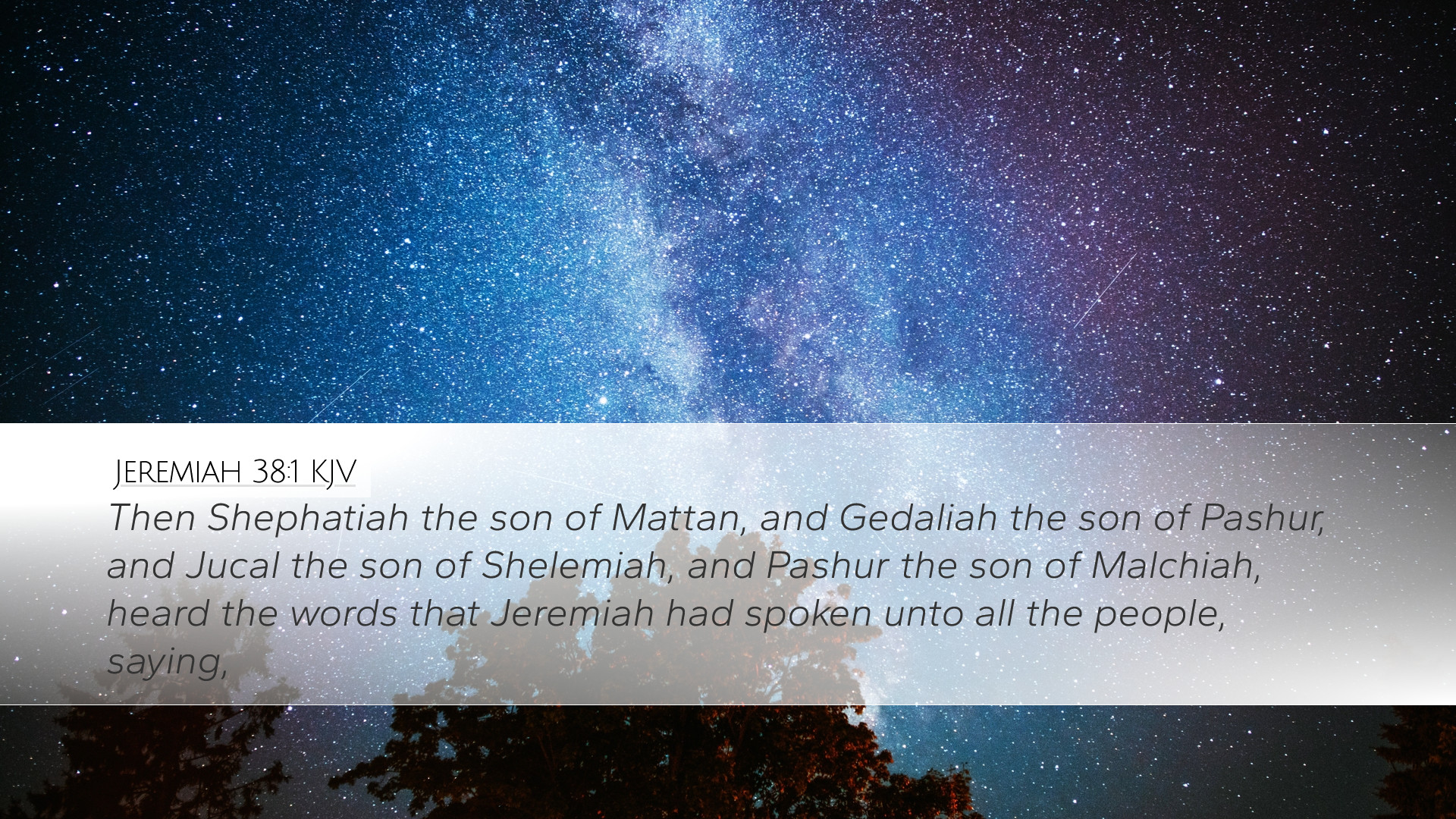Commentary on Jeremiah 38:1
Jeremiah 38:1 provides a critical glimpse into the tumultuous period of Judah's final days before the Babylonian captivity. In this verse, we observe the dynamics between the prophet Jeremiah and the officials of King Zedekiah, reflecting broader themes of loyalty, prophecy, and the fate of Jerusalem amidst impending doom.
Text of Jeremiah 38:1
"Then Shephatiah the son of Mattan, and Gedaliah the son of Pashhur, and Jucal the son of Shelemiah, and Pashhur the son of Malchiah, heard the words that Jeremiah had spoken unto all the people, saying."
Insights from Public Domain Commentaries
Matthew Henry's Commentary
Context of the Prophecy: Matthew Henry emphasizes the gravity of Jeremiah's situation, noting that he was delivering messages of judgment during a time of national crisis. The officials mentioned represent a collective leadership that opposed Jeremiah's pronouncements, reflecting the divided sentiments among the people and their leaders regarding divine judgment.
Character of the Officials: The names mentioned—Shephatiah, Gedaliah, Jucal, and Pashhur—are indicative of a social and political structure that saw prophecy as a threat. Henry indicates that their presence signifies a tension between God's word, as delivered by Jeremiah, and the worldly wisdom dictated by political expediency.
Albert Barnes' Notes on the Whole Bible
Response to Jeremiah's Prophet: Barnes points out that the officials "heard the words" of Jeremiah, highlighting an important aspect of prophetic ministry: it is not just about proclaiming but also about the reception of God's word. Their roles as representatives mean they bear a significant responsibility for how they respond to divine messages.
Judgment vs. Reassurance: The officials likely sought to reprimand or silence Jeremiah because his prophecies instilled fear. Barnes separates the spiritual leadership from the political leadership, suggesting that the officials were more concerned with maintaining the status quo than acknowledging the prophetic warnings as valid and true.
Adam Clarke's Commentary on the Bible
Analysis of the Names: Clarke provides a detailed analysis of the names of the officials, suggesting that their lineage hints at their character and intentions. He discusses the historical implications of these names and their backgrounds, pointing out the tension between some who favored peace negotiations with Babylon and those who aligned with resistance and rebellion.
The Significance of God's Word: Clarke emphasizes the weight of Jeremiah’s words that pointed towards inevitable destruction if the people did not repent. This insistence upon prophetic truth serves as a crucial reminder of God's sovereignty and the human tendency to resist divine guidance when it challenges personal or national interests.
Theological Implications
This verse is pivotal in understanding the dynamics of obedience versus rebellion in prophetic ministry. It encapsulates the struggle between divine instruction and human resistance, a theme prevalent throughout Scripture.
- Divine Authority: Jeremiah's role as prophet showcases the unwavering authority of God's word, regardless of human opposition.
- Human Response: The varied reactions from the officials signify the broader human inclination to deflect accountability.
- Consequences of Rejection: The ultimate outcomes of disregarding prophetic messages serve as a warning to contemporary audiences about the dangers of ignoring divine guidance.
Practical Applications for Modern Readers
Pastors, students, and theologians can derive several applications from this verse:
- Embrace Prophetic Voices: There is a call for modern believers to recognize and heed the voices of God's prophets today, to discern truth amidst a cacophony of secular influences.
- Stand Firm in Truth: Like Jeremiah, followers of Christ must be prepared to stand firm in their beliefs, even when faced with opposition or ridicule.
- Evaluate Leadership: The verse prompts reflection on contemporary leadership within the church and society, encouraging accountability and alignment with God’s word.
Conclusion
Jeremiah 38:1 serves as a profound reminder of the challenges faced by those who proclaim God’s messages in unfriendly environments. By examining the responses of Zedekiah's officials through the insights of Matthew Henry, Albert Barnes, and Adam Clarke, we glean vital lessons about the importance of prophetic integrity and the ongoing relevance of God's word in guiding human affairs.


